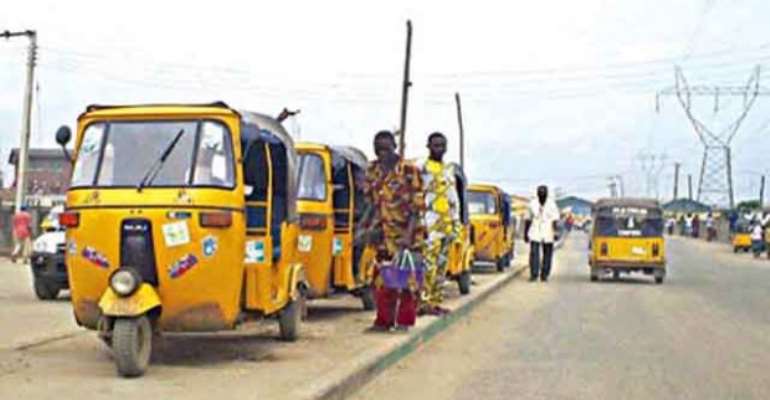Lagos issues yellow card to 'Keke Marwa'

August 2, 2012, Governor Babatunde Fashola signed Lagos State Road Traffic Bill into Law. The law restricted the activities of commercial motorcyclists, popularly known as 'Okada Riders', from about 475 roads in the state.
The measure, it was posited, was part of efforts to restore sanity to the roads away from the menace which the operators had constituted as well as tackle the rising wave of security challenge and health hazards posed to residents.
Recently, rumour was rife that the state government was set to ban tricycle operators, otherwise called 'Keke Marwa,' too from the roads following their recklessness.
However, the state government debunked the allegation.
Commissioner for Transportation, Comrade Kayode Opeifa, said there had never been any time that the state government announced that it had banned tricycle or motorcycles in the state.
He cited Section 3 of the Lagos Road Traffic Law 2012, which says, 'No person shall ride, drive or propel a cart, wheel barrow, motorcycle or tricycle on any of the routes specified in Schedule 11 of this Law'. According to him, motorcycles and tricycles were only 'Restricted' on 475 roads out of 9100 roads in the state including highway and bridges.
Keke Marwa operators waiting for passengers
Tricycle
Opeifa, however, said that tricycles and the use of unpainted vehicles were, of recent, restricted on Victoria Island, Government Reserved Area (GRA) Ikeja and Ikoyi due to request from residents as a result of the threat that tricycles and unpainted vehicles posed in, the area and the increase in the number of armed robbery attacks.
Opeifa who said that the restriction is well known to tricycle operators in the state, urged them to disregard the rumour and continue their operations in unrestricted areas in accordance with the law.
He, however, warned that if the operators are found wanting in complying with the road traffic law, government would not hesitate to apply appropriate sanctions against them.
'They have invaded Victoria Island axis and, as we discovered this, we have asked them to leave. The reason was that some people are financing those tricycles. We will be moving into the next phase and we will be embarking on the redistribution of vehicles on the road. One will see that residents of Lagos don't walk longer distances before they get vehicles plying their destinations,' Opeifa said.
'There is also the aspect of the law that states that every commercial vehicle should register. We haven't commenced enforcement on that. The entire sections of the law are not meant to be enforced at the same time. The level of enforcement will depend on the section that will be enforced.
'In terms of public compliance, we went on road show and did several media adverts to enlighten the public. The result was high level of compliance and we don't measure based on enforcement but on compliance.
'As we move into the second phase of the law, we have been able to achieve what we set out to do in the first phase. What we wanted in the first place was buying and acceptance of the law. '
The second phase, according to the commissioner, would demand closing on areas that required additional regulations and putting up structures to enhance their implementation.
'As we move ahead, we are now looking into a reform in the public transportation system. We are looking to reform in the way that commercial vehicles and taxis in the state operates,' he stated.
'We would also be looking into how to provide more public transport with the injection of more buses, so that there will be more public transport patronage. We are also looking into the on-street parking system. We have concluded the required policy but what was delaying it was the regulation.
'This is the time when we will commence the critical part of the law which is enforcement, a point where no one will say 'I don't know or I wasn't aware of the law'. We have concluded that aspect now.
'What we have been able to achieve will be apparent at the next stage. When we start to put up the structures that will enable the government officials to enforce the law, enforcement is more expensive than ensuring compliance, people do complain that officers of Lagos State Traffic Management Authority, LASTMA, apprehend them rather than explain the law to them.
'But they do not understand that it was very expensive to keep LASTMA officers on the road to enforce the law. But if I am able to give people good reason through media and community advocacy, it is cheap. The state government use less expensive methods to inform the residents rather than use tax payers' money to enforce few.'
New regulations
In apparent implementation of the second phase of the Road Traffic Law, as well as reduce traffic gridlocks on some major highways, government has restricted motorists from making left-turns where they presently do at Mobolaji Bank -Anthony Way, Ikeja. The restriction commenced August 3..
Opeifa, speaking at a stakeholders forum on the proposed junction improvement gridlock resolution on the road, organized with the residents of Government Reserved Area, GRA, at Police Officers Mess, stressed that the measure became necessary in order to alleviate suffering of the people who are usually caught in traffic for a long time on the corridor as a result of the traffic gridlock generated at Country Club junction, Sheraton and Ola Ayinde by Customs.
Henceforth, motorists are restricted from making left turn from Mobolaji Bank Anthony Way into Joel Ogunaike Street as well as left turn from Mobolaji Bank Anthony into Ola Ayinde.
Motorists inbound Ikeja would be made to proceed to PROTEA before making a u-turn while motorists inbound GRA, Ikeja would now be allowed to make a u-turn before the newly engineered u-turn just in front of the entrance of the Police Anti Bomb junction along Mobolaji Bank Anthony.
